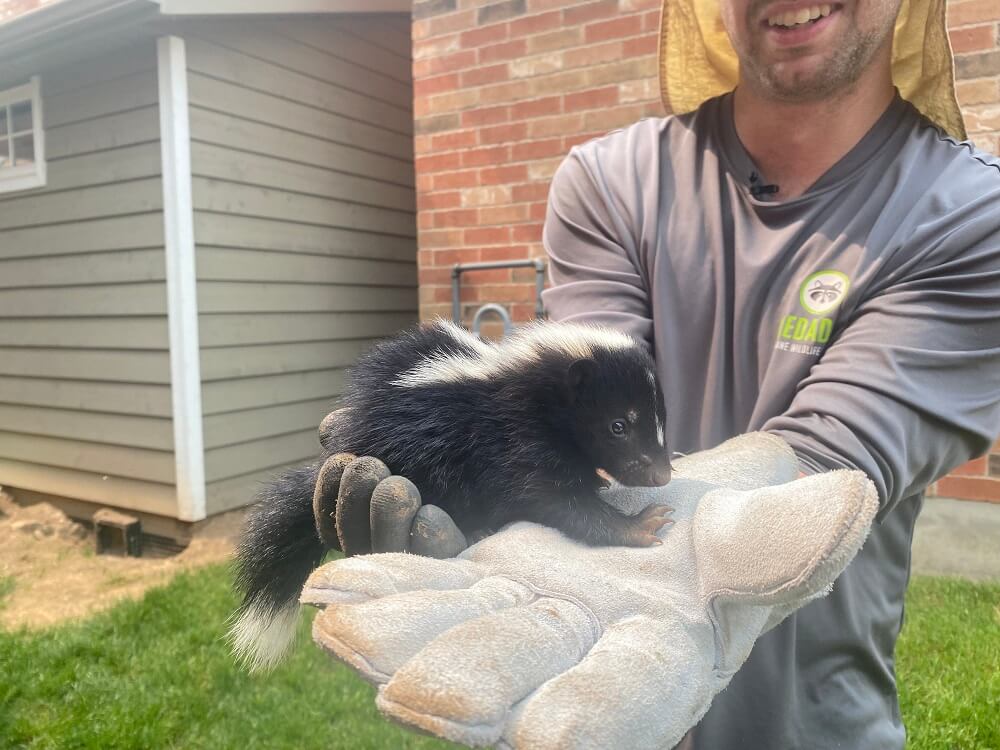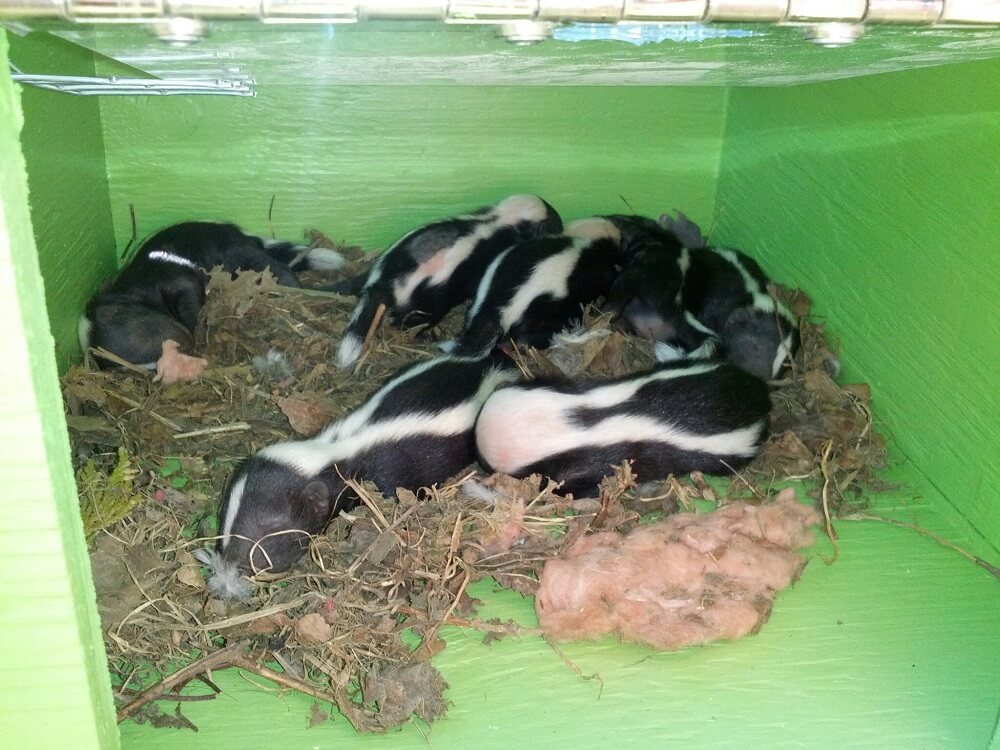SKUNK REMOVAL PROCESS
Assess and Remove
To solve a skunk problem, we start with a complete assessment of your property to determine where the skunks are living and how they’re gaining access. Since skunks do not climb our inspection will focus on the ground level den sites like porches, decks and sheds. We then perform a careful and humane removal, including any babies.
Clear and Clean
Once we humanely remove any skunks and their babies we will move on to clearing the den site of any damaged property, nesting material or debris that was gathered by the animals. We can then begin cleaning, disinfecting and deodorizing the area to eliminate any risk of illness, irritating odors and attractants for other wildlife.
Prevent and Protect
To prevent a future skunk problem, our technicians will get to work installing protective barriers designed to keep skunks out. This usually involves digging out around the perimeter of the deck, shed or porch and burying a heavy steel mesh deep into the ground. Our workmanship and materials are backed by a lifetime warranty.
Have you ever smelled that pungent odor wafting through the air around your property? It’s an unmistakable stench that often indicates a skunk has taken up residence nearby. These little creatures may be cute to look at, but they can become a major nuisance if they decide to call your home their own.
That’s where Skedaddle Humane Wildlife Control comes in. Our skunk removal services in Anoka County provide a humane solution for getting these animals off your property. We understand that simply capturing and killing these animals is not an ethical or effective solution. Instead, we use specialized techniques and equipment to safely and humanely relocate skunks to more appropriate habitats, ensuring they can continue to thrive without causing havoc in your backyard.

Skunks in Anoka County
Unlike other types of wildlife that are driven out of the area as urban development expands, skunks are able to thrive in suburban environments. They often borough under decks, porches and outdoor sheds to sleep in the daytime hours and emerge at night to find food. Because skunks are notorious for the scent glands they use to spray a noxious odor whenever they feel threatened, no one wants to have one of the animals living near their house.
Skunks are omnivores that consume a wide and varied diet. In the wild, they consume berries, small rodents and insects. In urban and suburban areas, skunks have easy access to food when they raid trash cans for leftover scraps. They are also known to feast on pet food that is left out.
Anoka County provides an ideal landscape for skunks. With the Mississippi river running through the Western side of the county and several lakes found around almost every community, skunks in Anoka County are surrounded by the water sources they need to survive. With water nearby, skunks have no trouble finding food in urban environments, often eating the grubs in our backyards, often leading them to find permanent residence under a structure. Homeowners in Anoka County find skunks living under their decks and porches each year.
How Dangerous Are Skunks?
Skunks are normally docile creatures that pose little threat to humans. They are not aggressive unless they feel threatened, but they can be startled easily. When they are afraid, skunks release a terrible odor from special scent glands. The smell is usually enough to deter would-be predators, and because it can take days or even weeks to get rid of the odor after being exposed to it, most people want to give skunks plenty of space.
On the rare occasion that these scent glands fail to drive away predators, skunks use their incredibly sharp claws and teeth to fight off attackers. Because the creatures are notorious diggers, they have super sharp claws that are capable of slicing through metal fencing.
How Do You Know a Skunk Lives On Your Property?
Skunks are shy creatures and prefer to avoid interactions with humans. Because they are nocturnal, they sleep in their burrows during the daytime hours and only come out at night. Most people never see these skunks that live on their property and must look for other signs of the animals’ presence.
The presence of burrows is the most obvious sign that there is a skunk on your property. A skunk burrow is deep and narrow. They are usually found at the base of other objects so you often find them near buildings or fallen trees.
The other obvious sign of a skunk living on your property is ripped-up sod. A favorite food of most skunks is grubs that they find under pieces of sod, so they tear up the grass while looking for grubs and other insects. Their sharp claws make it easy for the animals to tear up your lawn, so if you wake up and find numerous holes in your front yard or places where grass has been shredded, a skunk is likely the culprit.
Residents in Linwood and Nowthen are just as likely to face skunk problems as those living in more densely urban areas such as Fridley and Blaine. No matter if your backyard is small or large, skunks will likely use it as a place to find food, and in turn may make their way under your deck or porch to settle in permanently.

Humane Methods of Skunk Removal
Anoka County has a diverse ecosystem, and skunks play a critical role. If you have a skunk living on your property, you want to remove it in a humane way so it finds a more suitable place to live. Skedaddle knows how to get rid of skunks by using humane exclusion tactics.
When we identify a skunk burrow on your property, we install a one-way door. This strategy allows the animal to exit the den but not return. While the skunk is foraging for food, we check the den for babies. If we find any kits, we remove them by hand and place them in a padded reunification box. This tactic minimizes human contact while keeping the babies warm until we set the box in a place where the mother can easily find it.
The final step in the removal process is showing you how to make your property an unappealing environment for skunks.
Trust Skedaddle With Skunk Removal in Anoka County
Anoka County has many forested areas where skunks can live happily. Although they can find many sources of food in the wild, skunks often find easier sustenance on suburban properties and may create a den in the area. When you need to know how to get rid of skunks in a humane manner, Skedaddle Humane Wildlife Control is ready to help. Contact us today to schedule an appointment for skunk removal in Anoka County.
Fun Facts
FACT:
Skunks are omnivores, and the vast majority of their diet includes; plants, small animals and insects. This is why skunks find their way backwards to gardens, looking for the grubs under the soil.
FACT:
Skunks are nocturnal creatures who spend more of their active hours forging for food at night. Skunks may sometimes be out during the day if there are particular food sources available at the time or if they are threatened by a predator.
FACT:
Skunks will usually give a warning sign before spraying their sulphuric defense mechanism. A skunk will signal that they are going to spray by stomping their feet, raising their tail and turning their head and rear end towards you in a ‘U’ shape.
FACT:
Skunks do not hibernate Instead, they go into a state of decreased physiological activity called torpor. During this time, skunks reduce their body temperature and metabolic rate and rarely venture outside the den. This allows them to rest through Minnesota’s cold winters.
FACT:
Skunks have a unique adaptation that allows them to withstand their own spray. Their fur contains a natural oil that helps to neutralize the odor and protect their skin from irritation.







